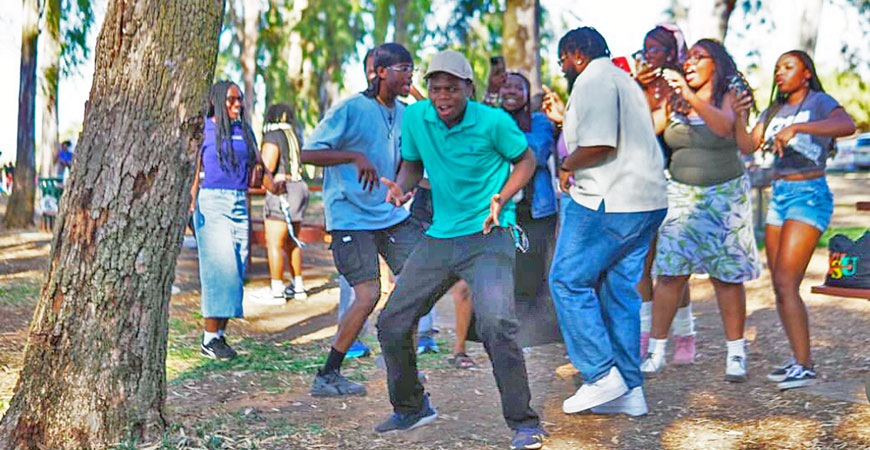
This story is part of a series for Black History Month. Read more stories highlighting Black excellence at UC Merced.
The Black Scholars Resource Center might be one of UC Merced’s best-kept secrets, although its leaders hope that changes soon.
It takes up two rooms – 101 and 102 – on the bottom floor of Granite Pass, the BSRC is not visible from any highly trafficked areas on campus. But it's worth the walk there for students who want to cultivate their sense of community, study, access resources and find a variety of events and programming for them.
“It kind of came about because students were interested in having this space to relax and hang out and be their authentic selves,” said Destany Charles, assistant director of the Office of Social Justice Initiatives and Identity Programs. She oversees the BSRC and the Asian & Pacific Islander Resource Center. “Students were the ones who fought for the space to be created.”
Anyone visiting the center will find a comfortable place to study, watch a movie, play ping pong or board games or grab a free snack and just chill. They will also find resources to help them succeed on their college journeys, from meeting with others who can be listening ears, mentors and tutors, to directions to financial, educational and even mental health resources.
“We offer a variety of services, but the main thing is we want to provide a safe space for students to engage in progressive dialogue and create unity, and we hope that in this way we will be able to increase retention of Black students,” Charles said. “But we also have practical items for their educational success, including Blue books and Scantrons and free printing.”
The BSRC also offers events and programs for students to participate in, including the upcoming cultural food festival called Taste of Soul, which gives students a chance to eat some of the foods they grew up with.
“We highlight foods from all across the African diaspora, but we specifically focus on Southern food – Black soul food,” Charles said.
Through the end of the semester, the center is also hosting BSRC Barber Shop, where students can come in for free haircuts.
Although Charles oversees the center, much of what goes on there is student-driven.
Aneesa Reynolds, a graduating cognitive science major, is this year's lead scholar coordinator. In addition to running the day-to-day operations at the center and working on collaborations with the Black student organizations and clubs on campus, she is responsible for planning BSRC programs and events such as Social Justice Bingo Night, Black Balance – a workshop helping students juggle their commitments to their education and social justice activism – and an annual two-day social justice retreat at Wonder Valley Ranch and Resort, just east of Fresno.
“This year's retreat is focusing on micro-activism and ways to make a difference in your community without being on the front lines or having a bullhorn,” Reynolds said. “Last year's was Good Trouble – how we can be radical in our activism and self-care.”
The Office of Social Justice Initiatives and Identity Programs pays for the trip, and in addition to the workshops and seminars, students can participate in outdoor activities such as zip lining, hiking, an obstacle course and ropes courses.
Students must apply for the retreat by writing 300 to 400 words on why they want to attend. Reynolds said last year's retreat drew between 20 and 30 participants.
“It's a free weekend. Who doesn't want that?” Reynolds said with a smile. “But the responses have been really genuine. People really do want to be there and actively participate. It's a great time for us to do team activities and come together, bounce ideas off each other and just coalesce.”
“My biggest hope is that the center will just continue to grow, and that community will continue to be cultivated and fostered here because we are a minority in this world and we are a minority on this campus, but we can use our voices to make the change we want to see,” Reynolds said.
The one message she has for students who don't know about the center or don't take full advantage of all it offers is this:
“This space is for you. It was built for you, so come in, use the space and use your voice,” she said. “If you don't like the way programs are being planned or implemented, use your voice, because all of this is paid for through your student fees. This is your space.”






